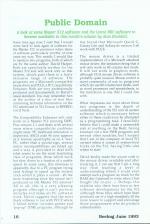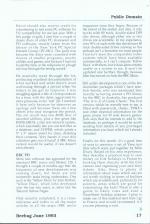A look at some Master 512 software and the latest BBC software to become available in this month's column by Alan Blundell.
Public Domain
Some time ago now, I said that I would come back to look again at software for the Master 512 co-processor when items of software particularly worthy of note came my way. This month, I would like to mention two programs, both of which are by the same author: David Harper.
Both are specifically written for the Master 512 and will work only on that system, which puts them in a fairly exclusive range of software. The programs are a Microsoft-compatible mouse driver and PCCE, a PC Compatibility Enhancer. Both are very professionally produced and documented, to David's usual standard. You may remember him as the author of a disc of text files containing technical information on the 512 mentioned in 512 Forum in Beebug vol. 11 No. 8.
The Compatibility Enhancer will only work on a Master 512 running DOS-Plus version 2.1 and deals with several areas where compatibility problems might arise: PC keyboard emulation is improved; ASCII code 96 now appears as a reverse apostrophe as on a 'real' PC, rather than a pound sign; several minor incompatibilities are tidied up; and a way is provided to deal with what seems to me the most frustrating class of programs, those which work but slow down to a fraction of a usable speed. In some cases, this slowness is apparently due to a PC program trying (and failing) to speed up the system clock whilst it plays a sound - all the more frustrating since the sound isn't produced on the Master 512 anyway!
All in all, this is a very pleasing program although it can't perform miracles and make all PC software work. David suggests that the most likely software to run with PCCE where it failed before includes games and 'pop-up' (TSR) programs, although he has found that Microsoft Quick C, Galaxy Lite and AsEasyAs version 5 all work with PCCE.
The mouse driver is a limited implementation of a Microsoft standard mouse driver, the limitation being that it will only work in 80 column text mode. It will not work in graphics mode, although CGA mouse driven software is probably quite unusual. Mouse control is most commonly of use in programs which do use 80 column text mode, such as word processors and spreadsheets, so the limitation is one that I could live with.
What impresses me most about these two programs is the depth of understanding of the 512 and its system software which is necessary before either of these could even be attempted as a programming task. I fancifully believe that I could make a reasonable stab at anything on the Beeb, having knocked out a few SWR programs and several other sundries, but I suspect that I am in the company of most 512 owners when it comes to system-level tricks on the 512, having little idea where to start.
David kindly made the source code to the mouse driver available and after studying it, I can see that I am a long way from reaching a level of understanding where I could even attempt such a program (so much for the RAM disc I planned to write when I first bought the co-pro...). Perhaps this explains why there have been so few software developments for the 512 (although those titles which have been produced are of a high standard); all the more reason to support and encourage those programmers who do produce enhancements.
David should also receive credit for volunteering to test some PC software for 512 compatibility for me last year. With a few pangs of guilt, I sent him a couple of dozen discs of older PC shareware and PD software, mostly taken from the library of the New York PC Special Interest Group (PC-SIG). The guilt was because the discs were crammed with dozens of smaller programs, mostly utilities and games, and because I had not found the time or the willpower to plough my way through the testing myself.
He manfully went through the lot, producing excellent documentation of what worked and what didn't, even continuing through a period when his letters to me got no response. I was struggling against a tide of correspondence for a time, with the delay aggravated by extra pressures in my 'real' job. I mention it here only because he deserves an apology and because there are a few others who may recognise the period.
The net result was one 800K disc of assorted utilities, plus a few gems like KWSEARCH, a free text retrieval system, which essentially lets you use text files as a database, and COVER, which prints a 5" x 5" sleeve insert for discs, detailing their contents. Very handy if your disc collection gets out of hand! A BBC Micro version would be useful, if one doesn't exist already.
BBC PD
More new software has appeared for the standard BBC micro and Master 128. I thought a couple of months ago that the frequency of new developments was slowing down, but there are still mammoth tasks being undertaken. One such is the "Yellow Discs" by John Bythell. 'Yellow Discs', which John developed over the last two years, is rather like the Telecom Yellow Pages.
Only recently completed, it is a cross-reference and index to all the major articles in all the major BBC micro magazines since they began. Because of the extent of the system and data, it only works with 80 track, double-sided DFS disc drives, although either one or two drives are acceptable. In my experience, over 90% of users with disc drives have 80 track double-sided drives anyway, so this perhaps isn't a limitation for most people.
I haven't seen the comparable index systems which have been available commercially, so I can't compare 'Yellow Discs' with them, but it does seem entirely usable as a system to me. It won't be updated any further, though, because John has moved on from the BBC Micro.
Still under development is one of the few Australian packages which I have seen. Jock Smylie, who was mentioned here recently as having started a PD library for the BBC in Australia, has produced 'The A to Z of Game Cheats'. The first version, which he recently sent to me, is filled with passwords, cheats, 'POKE's and other essential information for the game player for 99 well known games. Jock says that he intends to add to the database, so perhaps it would be worth sending him details of any privileged information you have which isn't already included.
Finally for this month, it's a good time of year to mention a set of View text files which were put together by Mick Drury. Based on his own experience, they describe a practical way to save money on Gite holidays in France by booking them directly with the Gite owners and organising your own ferry tickets. Also, there is plenty of information about areas which are/are not worth visiting in terms of facilities which are available and, particularly for parents, areas which are good for entertaining the kids!
There is also a guide to likely costs and even a ViewSheet holiday planner. I plan to make use of this material next time I go to France and would recommend it if you are planning a visit.
This article was converted to a web page from the following pages of Beebug Volume 12 Number 2.


 1st June 1993
1st June 1993

